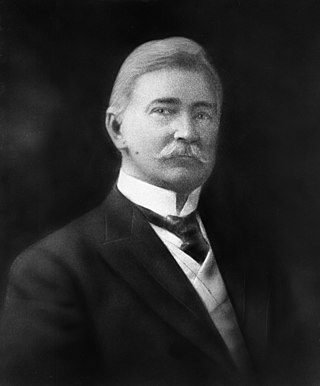Related Research Articles
The "Republican Revolution", "Revolution of '94", or "Gingrich Revolution" are political slogans that refer to the Republican Party's (GOP) success in the 1994 U.S. midterm elections, which resulted in a net gain of 54 seats in the House of Representatives, and a pick-up of eight seats in the Senate. It was led by Newt Gingrich.

The 1948 United States Senate elections were held concurrently with the election of Democratic President Harry S. Truman for a full term. The 32 seats of Class 2 were contested in regular elections, and one special election was held to fill a vacancy. Truman campaigned against an "obstructionist" Congress that had blocked many of his initiatives, and additionally, the U.S. economy recovered from the postwar recession of 1946–1947 by election day. Thus, Truman was rewarded with a Democratic gain of nine seats in the Senate, enough to give them control of the chamber. This was the last time until 2020 that Democrats flipped a chamber of Congress in a presidential election cycle.

The 1944 United States House of Representatives elections were elections for the United States House of Representatives to elect members to serve in the 79th United States Congress. They were held for the most part on November 7, 1944, while Maine held theirs on September 11. These elections coincided with President Franklin D. Roosevelt's re-election to a record fourth term.

The 1822–23 United States House of Representatives elections were held on various dates in various states between July 1, 1822, and August 14, 1823. Each state set its own date for its elections to the House of Representatives before the first session of the 18th United States Congress convened on December 1, 1823. They occurred during President James Monroe's second term.

William Bailey Lamar was an American attorney and politician who served as a U.S. representative from Florida from 1903 to 1909.

The 1803 United States Senate election in New York was held on February 1, 1803, by the New York State Legislature to elect a U.S. senator to represent the State of New York in the United States Senate.

The 1993 United States Senate special election in Texas was held on June 6, 1993, to replace Democratic U.S. Senator Lloyd Bentsen, who had resigned to become Secretary of the Treasury. Governor Ann Richards appointed Democrat Bob Krueger, a Texas Railroad Commissioner, to fill the seat. Krueger ran in the special election, but was defeated in a landslide by Republican Kay Bailey Hutchison. The nonpartisan blanket primary was held on May 1, 1993. Since no candidate received a majority in the primary, a runoff was held on June 6, 1993.

The 1802 United States House of Representatives elections in New York were held from April 27 to 29, 1802, to elect 17 U.S. Representatives to represent the State of New York in the United States House of Representatives of the 8th United States Congress.

The 1816 United States House of Representatives elections in New York were held from April 23 to 25, 1816, to elect 27 U.S. Representatives to represent the State of New York in the United States House of Representatives of the 15th United States Congress. At the same time, a vacancy was filled in the 14th United States Congress.
Elections to the United States House of Representatives were held in Pennsylvania on October 14, 1828, for the 21st Congress. Members of three different parties were elected to the 21st Congress, the first time in US history that a third party won seats. The new Anti-Masonic Party won a total of 5 seats, 1 of which was in Pennsylvania.
A special election was held for the Indiana's 1st district after William Prince (DR-Jackson) died on September 8, 1824.
On October 15, 1824, Charles Rich of Vermont's at-large district died in office. A special election was held for his replacement.

On July 4, 1816, Representative Thomas Gholson, Jr. (DR) of Virginia's 18th district died in office. A special election was held to fill the resulting vacancy on October 10, 21–23, and 28, 1816.

Special elections were held in Maryland's 5th congressional district on January 1, 1823, to fill vacancies in the 17th and 18th Congresses caused by the resignation of Samuel Smith (DR) after being elected to the Senate. Smith had been re-elected to the House in October. His resignation therefore created vacancies both in the remainder of the 17th Congress and in the 18th Congress.

On April 21, 1823, William B. Rochester (DR) of New York's 28th district was appointed judge of the Eighth Circuit Court and resigned his seat in the House. A special election was held to fill the resulting vacancy.

On May 8, 1822, the last day of the First Session of the 17th Congress, William Milnor (F) of Pennsylvania's 1st district resigned. A special election was held to fill the resulting vacancy on October 1, 1822, a week before the general elections for the 18th Congress.
A special election was held in Massachusetts's 10th congressional district to fill a vacancy caused by John Bailey (DR) being declared not eligible for the seat which he had won the previous year on March 24, 1824. The election was held on August 30, 1824, with additional ballots held on November 1 and November 29 due to a majority not being achieved on the first or second ballot.

A special election for Pennsylvania's 18th congressional district was held on March 13, 2018, following the resignation of Republican representative Tim Murphy. Murphy, who held the seat since January 3, 2003, declared his intent to resign on October 5, 2017, and vacated his seat on October 21 that year. Democrat Conor Lamb defeated Republican Rick Saccone 49.86% to 49.53%. Saccone conceded the race eight days after the election.